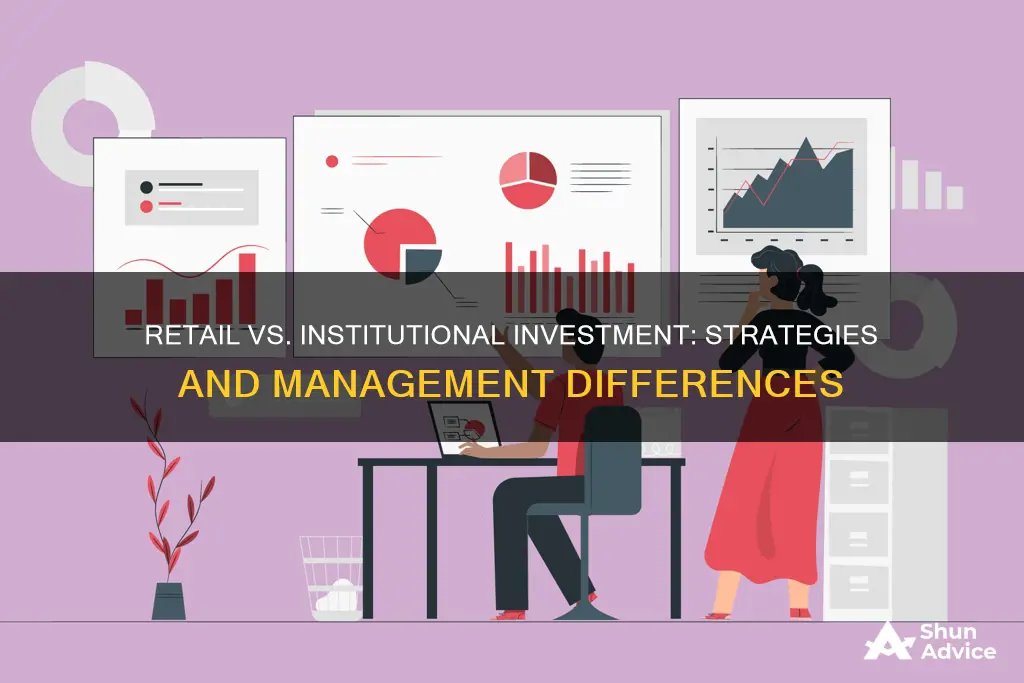
Institutional investors and retail investors are the two primary types of investors, each with distinct features and investment goals. Institutional investors are organisations that manage large pools of capital on behalf of clients or members. They include entities such as pension funds, mutual funds, insurance companies, and investment banks, which often deal with substantial amounts of money. On the other hand, retail investors are individuals who invest their own money, usually through brokerage or retirement accounts. They are considered non-professional investors who make smaller and less frequent trades compared to institutional investors. While institutional investors have access to extensive resources and information, retail investors often rely on their own research or advice from financial advisors. Understanding these differences is crucial for aspiring investors as it provides valuable insights into market behaviour and potential investment opportunities.
| Characteristics | Retail Investors | Institutional Investors |
|---|---|---|
| Description | Individuals who invest their own capital | Organizations that invest on behalf of others |
| Trade Volume | Smaller amounts | Large volumes |
| Trade Frequency | Less frequent | More frequent |
| Investment Horizon | Shorter | Longer |
| Capital | Smaller | Larger |
| Investment Strategies | Long-term investing, day trading, swing trading, options trading | Value investing, growth investing, dividend investing, quantitative models |
| Investment Decisions | Personal research, financial advisors, market trends | Comprehensive research, financial models, analysis, due diligence, quantitative assessments, macroeconomic trends |
| Risk Tolerance | Varied | Disciplined risk management |
| Market Impact | Localised influence on individual stocks or sectors | Sway market prices and trends |
| Information Access | Retail-specific information, online platforms, mobile apps, financial news | Specialist knowledge, in-depth research, extensive market research, up-to-the-minute insights |
| Fees | Higher fees | Lower fees |
| Education | Not necessary | Typically have a degree in finance or a finance-related field |
What You'll Learn

Investment strategies
Institutional Investment Strategies
Institutional investors are large organisations that manage large pools of capital on behalf of their clients or members. They include entities such as pension funds, mutual funds, insurance companies, hedge funds, and investment banks. Institutional investors have access to extensive resources and information, and they often employ specialised investment teams to make decisions. Here are some common institutional investment strategies:
- Value Investing: This strategy involves seeking out stocks that are trading below their intrinsic value. Institutional investors carefully analyse a company's financials, earnings potential, and market position to identify these undervalued opportunities.
- Growth Investing: Institutional investors may focus on growth stocks, targeting companies expected to experience significant earnings growth. They look for innovative products, expanding market share, and strong competitive advantages.
- Dividend Investing: Many institutional investors opt for dividend-paying stocks to generate consistent income. These stocks are typically offered by companies with a history of stable earnings and a commitment to sharing profits with shareholders.
- Quantitative Models: Some institutional investors employ complex algorithms and quantitative models to analyse vast amounts of data, identifying patterns, trends, and potential investment opportunities.
Retail Investment Strategies
Retail investors, on the other hand, are individual investors who invest their own capital, often with a long-term perspective. They have access to a wide range of financial information and tools, and they can make informed investment decisions using online platforms, mobile apps, and financial news sources. Here are some common retail investment strategies:
- Long-Term Investing: Retail investors often adopt a buy-and-hold strategy, holding onto stocks for the long term to capitalise on growth and the effects of compounding.
- Day Trading: Day trading involves buying and selling stocks within the same trading day, aiming to profit from short-term price fluctuations.
- Swing Trading: Retail investors employing swing trading hold stocks for several days or weeks, aiming to capture price movements during short-term trends.
- Diversification: Diversification is a common strategy among retail investors, as they spread their investments across various industries and sectors to mitigate risk.
Blending Strategies
While institutional and retail investors have distinct approaches, there is an opportunity to blend strategies for a well-rounded investment approach. Retail investors can benefit from emulating some of the practices of institutional investors:
- In-Depth Analysis: Conduct thorough research and analysis before making investment decisions, studying a company's financials, industry trends, and competitive landscape.
- Long-Term Vision: Adopt a long-term perspective, aligning investment choices with financial goals. While retail investors may have fewer resources, a patient and disciplined approach can lead to positive results.
- Risk Management: Learn from institutional investors' disciplined risk management practices. Assess your risk tolerance and allocate your portfolio accordingly to ensure comfort with potential ups and downs.
- Continuous Learning: Stay committed to learning and adapt to changing market conditions, just as institutional investors constantly update their knowledge.
Structuring an Investment Portfolio: Strategies for Success
You may want to see also

Investor motivations
Institutional Investors
Institutional investors are organisations that manage large pools of capital on behalf of their clients or members. They include entities such as pension funds, mutual funds, insurance companies, hedge funds, and investment banks. Their primary motivation is to maximise returns while managing risk for their clients over the long term. They are responsible for efficiently allocating capital, providing market liquidity, promoting corporate governance, and contributing to overall market stability.
Retail Investors
Retail investors, on the other hand, are individuals who invest their own capital, usually with a focus on their personal financial goals. They may be motivated by a variety of factors, including retirement planning, saving for their children's education, buying a home, or making a large purchase. Retail investors typically have a shorter investment horizon and are driven by a desire to safeguard their future and build their personal wealth. They often invest in stocks, bonds, mutual funds, or other financial instruments to achieve their financial objectives.
Key Differences
The main difference in motivations between institutional and retail investors lies in the scale and nature of their investments. Institutional investors have a duty to act in the best interests of their clients, whereas retail investors are often driven by personal goals and have more flexibility in their investment strategies. Retail investors may be more susceptible to emotional decision-making, while institutional investors are considered more sophisticated and informed due to their access to extensive research and larger pools of capital.
Understanding Investment: 338 Investment Managers and Their Role
You may want to see also

Access to information
Retail investors have access to a wealth of information, but they have less access to the specialist knowledge and in-depth research available to institutional investors. Retail investors can tap into a tremendous amount of high-quality investing and trading research to inform their decision-making. They have access to a plethora of financial information and tools, including online platforms, mobile apps, and financial news sources, which empower them with real-time data.
On the other hand, institutional investors are specialists who have access to extensive market research and up-to-the-minute market insights. They are considered sophisticated investors with a deep understanding of market trends, financial instruments, and economic indicators. They have the resources to hire analysts, subscribe to pricey research and data services, and purchase computing power to optimise their decision-making and trading.
The difference in access to information between retail and institutional investors has been blurring in recent years due to technological advancements. FinTech platforms have improved retail investors' access to information, and online trading platforms and financial education resources have provided more opportunities for them to participate in financial markets and make informed investment decisions.
Investing Life Savings: Strategies for Long-Term Financial Growth
You may want to see also

Investment frequency
Retail investors trade at lower frequencies and volumes, with smaller amounts of money. They are usually long-term investors, driven by personal, life-event goals, such as planning for retirement, saving for their children's education, buying property, or making large purchases.
On the other hand, institutional investors trade frequently and in high volumes. They have a long-term investment horizon, focusing on stable and sustainable growth, and consistent returns over extended periods. They are considered more sophisticated and informed market participants, with access to more resources and information.
The difference in investment frequency is largely due to the disparity in capital sources and investment motivations. Retail investors use their own money and invest for their personal benefit, whereas institutional investors manage large pools of capital on behalf of clients or members, with a focus on long-term financial objectives and risk management.
Best Places to Buy Investment Portfolios: A Comprehensive Guide
You may want to see also

Regulatory treatment
Retail investors are perceived as being less sophisticated and are, therefore, offered greater protection by regulatory bodies such as the U.S. Securities and Exchange Commission (SEC) and the Financial Industry Regulatory Authority (FINRA). Retail investors are subject to more protective regulations due to their perceived lack of investment expertise and knowledge. The SEC aims to protect retail investors by ensuring they are given enough information to make good investment decisions.
On the other hand, institutional investors are considered sophisticated investors with a greater level of investment expertise and knowledge. As a result, they are subject to fewer protective regulations. Broker-dealers have more freedom when dealing with institutional customers than with retail customers.
The difference in regulatory treatment is largely due to the varying levels of investment knowledge and experience between the two investor types. Retail investors often have diverse investment strategies and varying levels of risk tolerance, whereas institutional investors are known for their disciplined risk management strategies and long-term investment horizons.
Additionally, the difference in account size and financial resources between retail and institutional investors contributes to the disparity in regulatory treatment. Institutional investors have access to greater financial resources, allowing them to hire analysts, subscribe to expensive research services, and purchase advanced technology to optimise their decision-making and trading.
While regulatory measures aim to protect retail investors from making expensive mistakes and being misled into inappropriate transactions, it is important to note that retail investors now have increased access to financial education, information, and tools, empowering them to make more informed investment decisions.
Finding Careers in Investment Management: Strategies for Success
You may want to see also
Frequently asked questions
Institutional investors are organisations that manage large pools of capital on behalf of their clients or members. Retail investors, on the other hand, are individuals who invest their own money, usually on their own behalf.
Examples of institutional investors include pension funds, mutual funds, insurance companies, hedge funds, and investment banks.
Institutional investors have access to substantial resources and information. They can conduct extensive research and analysis before making investment decisions. They also have more negotiating power and can access investments with large minimum buy-ins.
Retail investors have the freedom to invest in companies of any size and can hold cash or sell stocks when prices are high. They may also be able to take a more long-term approach and are less likely to be influenced by short-term market corrections.
Institutional investors play a crucial role in financial markets by providing liquidity, efficiency, and stability. They aim to maximise returns while managing risk for their clients.







